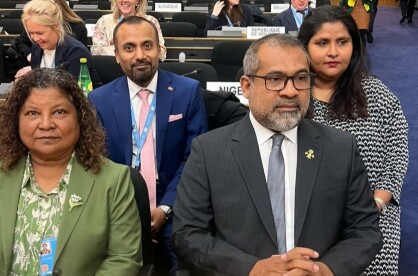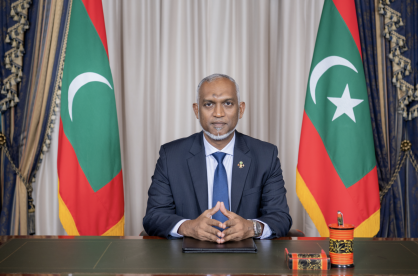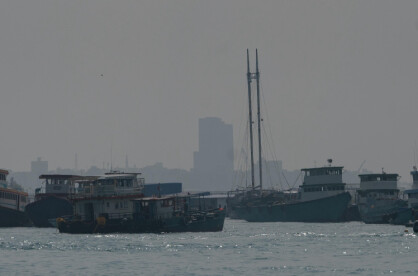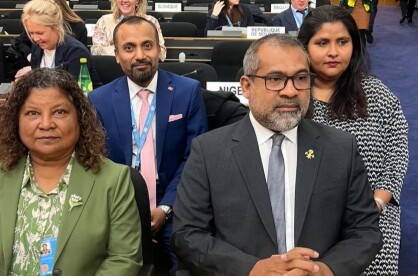Democracy hijacked!
Progress years in the making may well have been hijacked by the very forces that touted, and championed, the need for change.

Source - AP
Progress years in the making may well have been hijacked by the very forces that touted, and championed, the need for change.

Source - AP
Democracy is a fairly young idea to our shores, yet thankfully, and somewhat ironically, due to the Maumoon administration’s very focused approach on education, the Maldivian people were not only receptive to the idea, they even stood, mostly, shoulder to shoulder in solidarity of a more democratic approach to a more democratic nation.
However, is the dream of democracy fading enough to relapse into the nepotism that had been a hallmark before?
When Nasheed, before becoming president, championed the democratic awakening of the Maldivian people, his vision was clear. He called for an end to the nepotism of the Maumoon regime — for a restructuring of the administrative system to promote more democratic inclusivity, and also leveled political playing field, with a multi-party electoral processes. Although some of the weapons in Nasheed’s political arsenal were questionable, purportedly for the 'better good,' his followers, partners, and supporters found grievous fault in the ‘30 year regime’, and brought upon a peaceful revolution that would have allowed the educated society to clamber to greater heights.
Ideological differences were initially a large factor, but it was quickly lost in translation over the years. Whether by his doing or those of his followers, distrust and strife were the main moving forces, devolving the revolution into a fight of colours — as opposed to true ideologies. The clear principles of the democratic system faded into an almost tribalistic feud, tearing apart families, heavily affecting job security in both public and private sectors, and many more.
It came as no surprise that once Nasheed assumed the mantle of the presidency, won through what could later become apparent was an uneasy coalition at best, not only were participants of his coalition nearly entirely overlooked in dividing the spoils, his administration proceeded to remove nearly everyone who was connected to the previous administration from their posts, replacing them with not just loyalists for the most part but Nasheed loyalists. A move that was initially touted as a ‘cleaning of house' — of the alleged corrupt system — set a dangerous precedent for the future.
It did not take long for it to become apparent that most of the replacements to these positions of power were not actually qualified for the responsibilities that ensued. Economic, and administrative, policies began to be based on popularity rather than study and deliberation, creating policy changes that brought about economic detriments in the form of unaffordable loans, and fulfillment of political promises that did not put the citizenry first. Within a short two years, still charged by the recent revolution, Nasheed would have to step down after 22 days of constant protesting, leaving power in the hands of his Vice President Waheed. After more than two years of political stagnation bordering on chaos created by the Nasheed camp, Yameen contested in the following presidential election, won, and achieved some measure of control.
Upon the return of MDP to power, through what is once again unfolding as an uneasy coalition, led by President Solih, the cycle is repeating. Again. An entire washing-out of the higher tiers of the civil service sector, and replacing technocrats at ministerial level positions with not only those who are sorely under qualified, but those who were of questionable association to the rest of the administration. A cursory glance not only revealed a replication of the very system Nasheed had promised to dismantle, but nepotism of such a gross degree that even the very concept of Maldivian democracy is now up for debate. It was almost an image of an imposed monarchy that has seemingly been voted into power.
Take for example the People's Majlis; in a move deftly engineered by the MDP leadership, the Speaker and the Deputy Speaker are cousins having shared childhood homes. The 'Chief Executive to the Vice President', who is also the recently suspended Youth Minister's spouse, is in fact the Vice President's sibling, employed at a ministerial level in the highest office of the land. The Police Commissioner is brother-in-law to the President and the President of the Judicial Services Commission and the Attorney General had up until quite recently shared the same law firm letterhead. And sadly these are but only a few such examples.
Brothers, sisters, cousins, spouses and in-laws, best friends and loyalists, and even indebted political partners are apparent in a messy yet obvious web, and that without considering the nearly one hundred plus political appointments and State Ministers. Have the Maldivian people been hoodwinked so very eloquently into making the government, legislature, and even the judiciary, into a family business? While there could be many emotional and party-politic reasons for such a well-weaved web, it is important to assess other, more technical reasons, that may have forced such a ‘full-house’ of a hand being dealt.
The civil service, from the blue and white collar workers dealing with both paperwork and the labour that moves the nation, all the way to the secretarial and ministerial movers and shakers, are paramount to the proper administration of the country. This is a fact everyone accepts, yet those in the more influential positions seem to be dictated more on party politics alone than actual administration. This is obvious when every new appointee seems to dismantle policy work done by their predecessors, and then keep popular and manifesto driven ‘concepts’ at the forefront rather than sustainability or even achievability.
The unsurprising lack of technical expertise in these positions are apparent at the outdated and sometimes highly detrimental policy changes being brought about, most of which rocks the boat and then forces a reversion to old policies. The changes that the people fought for always seem to be slow in coming — the two year delay in changes to internet connectivity prices being an example. The main reason for this, while it stems from the culture of mistrust set by Nasheed, comes back to a lack of technical capacity.
Civil service jobs, while influential on the political sphere, need to be seen from a non-partisan angle. The positions need to be filled with those armed with the know-how required for a job of such calibre, and beyond that, there needs to be a culture of apprenticeships as well. Within the same department, ideological differences can, and should, exist, to improve democratic participation. The direction which each wing of governance moves in is decided by the incumbent powers, but the expertise needed should come from experienced, practical and pragmatic civil servants.
The civil sector needs to shed the five-year-term philosophy and think about sustainability. So many professionals are blacklisted and left unutilised simply because of a change in administration or personal ideological differences. There isn’t a monitored talent pool from where each administration can assign dependable, educated public employees. There is less attention given to actually scouting out talent in each department but rather more dependance on fulfilling pre-election party promises, and the consequences are most direly felt by the common people rather than the politicians.
It is quite simple. Every time the entire crew of a ship is replaced simply on a political basis, the time taken for the ship to reorient, time taken for the amateurs to learn the ropes, and the misguided decisions in-between would not only bring the entire rig to a significant standstill, but could also crash the ship into an iceberg that could have been seen were the sailors more keen-eyed, even keeled, and knew what to look for.
The people have already been demanding more accountability and they are owed it now. The administration should also to be aware of, and how the distinction between, political appointments and public service positions work.
Undoubtedly recent actions also belie the fact that the administration, and other political players, strongly realise the public might be onto their initial conceit; and that the people’s democracy is being hijacked once again for the glory of select clans and special interests.



